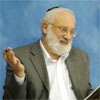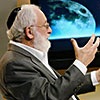Evening Zohar Lesson – 02.08.10
The Book of Zohar – Selections, Chapter “Ki Tissa (When You Take),” Item 44
Download: WMV Video|MP3 Audio

The Book of Zohar – Selections, Chapter “Ki Tissa (When You Take),” Item 44
Download: WMV Video|MP3 Audio
 A question I received: Why is The Zohar so difficult to understand? Is it due to our incomprehension of the text, or our lack of feeling and inability to detach from our familiar world?
A question I received: Why is The Zohar so difficult to understand? Is it due to our incomprehension of the text, or our lack of feeling and inability to detach from our familiar world?
My Answer: There is only one difficulty: It is the necessity to undergo surgery without anesthesia, with full awareness and desire. We have to go through a surgical transplant that will extract our egoistic heart and mind and implant love for all, along with thoughts only about this.
 A question I received: During The Zohar lesson I feel that I’m thrown from side to side like a boat in a storm. Sometimes I feel good about it, and other times very afraid. Is this good for me, or to the contrary?
A question I received: During The Zohar lesson I feel that I’m thrown from side to side like a boat in a storm. Sometimes I feel good about it, and other times very afraid. Is this good for me, or to the contrary?
My Answer: We have to understand that there is no connection between what we read, what we feel, or in fact, what goes on inside us. During the lesson, The Zohar works on us as if we’re pressing buttons on a device whose functions we don’t understand. It is like a child, for example, who pulls a mobile phone out of his father’s pocket, plays with the buttons, and accidentally calls someone or sends a message. Similarly, when we read The Zohar we’re pressing “buttons” without understanding what forces we induce. Therefore, the reactions we feel in response are not at all connected with our initial actions.
We may think of our friends, the whole world, and the Creator with love, and suddenly become plagued with the opposite concern, wondering, “Why am I even trying to do this?” Or it may occur the other way around where we blame the Creator, the group, and ourselves, but suddenly something good appears that we didn’t feel we deserved.
The Zohar speaks to us like a parent would speak to an infant who doesn’t understand what is being said to him. The parent knows everything about the baby, but the infant doesn’t understand anything about the parent. In spirituality we are at the level of an infant. This is why we shouldn’t draw conclusions based on our sensations, since they are not properly connected.
It may be that we’re thinking everything is a mess and feel only problems and confusions, when in fact everything is perfectly arranged. We need to be mindful that regardless of what happens, we continue with our studies until deliverance comes. We are advised to avoid worrying about something which occurs along our path, and it is written, “Do whatever you want, but don’t leave!”
We need a certain measure of persistence, devotion, and patience on our spiritual path. Baal HaSulam writes in the “Preface to Study of the Ten Sefirot,” that “Only those heroes who possess real patience manage to climb the mountain and enter the King’s palace.” Thus, we need to allow The Zohar to influence us by means of the Surrounding Light.
 Good, bad, or indifferent – it doesn’t matter how we feel while reading The Book of Zohar. The most important thing is to carry on our effort regardless of what we may or may not feel. If we let it pour into ourselves like an infusion, then it will do its job within us.
Good, bad, or indifferent – it doesn’t matter how we feel while reading The Book of Zohar. The most important thing is to carry on our effort regardless of what we may or may not feel. If we let it pour into ourselves like an infusion, then it will do its job within us.
We rise above our egoistic impressions by not paying attention to what our egoistic desire feels. Whether we’re in a state of fear or joy, whether we feel irritated or confused, we are above it. In other words, one thing doesn’t depend on the other and we continue to work despite what we feel.
The Creator intentionally trains us through our egoism and desire for pleasure. However, we have to constantly rise above this sensation and continue to walk the path as if nothing happened.
We have to say to the Creator, “It’s not Your gifts that are important to me; it is You who I need! Don’t confuse me with all the other sensations!” Only this kind of persistence will yield results.
 When we read The Book of Zohar, we have to demand spiritual elevation. The demand can happen even through our sensation of being close to this book, the feeling that we value it, that we want it to shines upon us and perform changes inside us.
When we read The Book of Zohar, we have to demand spiritual elevation. The demand can happen even through our sensation of being close to this book, the feeling that we value it, that we want it to shines upon us and perform changes inside us.
Sometimes this feeling is very difficult to attain; it comes only after a few hours of studying. Nevertheless, it still has a great effect when we constantly apply effort in trying to feel the words of the text inside ourselves. As a result, we awaken the Light that Reforms. Gradually our effort adds up and the law of “I labored and found” goes into effect. We only need patience because nothing else will help.
 The Zohar, Chapter “Miketz (At the End),” Item 161: “And he put them all together in prison for three days.” These three days correspond to the three days of Shechem, as it is written, “And it came to pass on the third day, when they were in pain.”
The Zohar, Chapter “Miketz (At the End),” Item 161: “And he put them all together in prison for three days.” These three days correspond to the three days of Shechem, as it is written, “And it came to pass on the third day, when they were in pain.”
The third day is always connected with pain. It is the hardest day in the process of correction because it is the day when the mutual inclusion of the right and left lines occurs. It is not like the first day, which is all about the right line and when we arm ourselves with the power of bestowal, nor is it like the second day, which is all about the left line, when we check which of its parts we can connect with the desire to bestow. The third day is about the reciprocal inclusion of one property into another, which results in the creation of a new, intermediate property.
Reciprocal inclusion exists only in spirituality; it never happens in our world. In this world there exists only one type of connection – when two objects unite. For example, the first object contributes its intellect whereas the other one donates emotions. They connect and replenish each other. This happens because in our world everything possesses only one property – the will to receive. Therefore, all inclusion in our world occurs only within this one property, which takes on various aspects and forms.
Mutual inclusion in spirituality, however, means that something brand new emerges – a third entity comprised of the first two. This is, in fact, a completely new phenomenon that didn’t exist previously. This “something” is called the Soul, the Human, or Adam.
 The Zohar, Chapter “Miketz (At the End),” Item 178: The Creator made it for man to strengthen himself in the Torah and to walk on the path of truth and toward the right side, and not to the left side. And because people need to walk to the right side, they should increase the love between each other. This is because love is considered “right,” and there will not be hatred between each other, which is considered left, so as to not weaken the right—the place to which Israel cling.
The Zohar, Chapter “Miketz (At the End),” Item 178: The Creator made it for man to strengthen himself in the Torah and to walk on the path of truth and toward the right side, and not to the left side. And because people need to walk to the right side, they should increase the love between each other. This is because love is considered “right,” and there will not be hatred between each other, which is considered left, so as to not weaken the right—the place to which Israel cling.
This paragraph seems to be speaking about life in a corrected society or group, but we still have to decipher what it means through our inner discernments. There is no difference when The Zohar speaks about an apparently external assembly of people or about a gathering of inner properties of our soul. It is the same thing since everything consists of the same ten Sefirot. We all contain the vessel of our common soul (Adam Rishon) and the same internal states of ten Sefirot exist in each of us.
This is why sometimes The Zohar uses inner definitions when it describes our properties or when it tells us about what the group should be like; sometimes it depicts only one person, or animals. We must try to see multiple levels at the same time: the inner level of our soul, the level of our group and our connection with friends, and the level of all humankind. In the future, all these levels will unite.
 The Zohar, Chapter “Miketz (At the End),” Item 33: “Them that await His mercy.” “Them that await His mercy” are those who engage in Torah at night and partake with Divinity. And when the morning comes, they await His mercy.
The Zohar, Chapter “Miketz (At the End),” Item 33: “Them that await His mercy.” “Them that await His mercy” are those who engage in Torah at night and partake with Divinity. And when the morning comes, they await His mercy.
The Zohar also talks about this in the article, “The Night of the Bride.” It describes all the days of exile as a dark night, during which we prepare our desires (Kelim) for the connection between the Groom and the Bride that will happen in the morning.
All who prepare for this meeting are called the dwellers of the King’s palace. The moment that they complete building the wedding canopy (Huppah, symbolizing a screen and the Reflected Light), the Creator (Zeir Anpin) unites with His Shechina, which is the union of all souls. This is the vessel for receiving the Light. Then the Bride unites with the Groom; the two compliment each other and attain a state of perfection and peace.
When a person engages in Torah at night, a thread of mercy extends upon him during the day….
It is impossible to engage in the Torah during the day, because the day is when unification happens. At that point, everything is revealed and there is no more work to be done. Our work lies in exercising our freedom of choice, while in fact we already exist in the perfect state. We just need to “prefer” it, meaning to choose day over night.
When we decide that bestowal is day, we will reveal it as being day. Through the Reflected Light, we awaken day and Light instead of darkness. This is why all the work happens at night; it’s because all our choice and efforts are concentrated there. There is no work that can be done during the “day.”
![clip_image001[6] clip_image001[6]](http://www.laitman.com/wp-content/uploads/2010/02/clip_image0016_thumb.jpg) The Zohar, Chapter “Ki Tissa (When You Take),” Item 16: “All those who are angered at you will be shamed and dishonored.” The Creator is destined to do unto Israel all that good, which He had said through the prophets of truth, and for which Israel greatly suffered in the exile. Had it not been for all that good that they await and see, which is written in the Torah, they would have been unable to tolerate and stand the exile.
The Zohar, Chapter “Ki Tissa (When You Take),” Item 16: “All those who are angered at you will be shamed and dishonored.” The Creator is destined to do unto Israel all that good, which He had said through the prophets of truth, and for which Israel greatly suffered in the exile. Had it not been for all that good that they await and see, which is written in the Torah, they would have been unable to tolerate and stand the exile.
This means that a person gains a greater desire for correction, called “Isra-el” (directly to the Creator), by anticipating the goodness and abundance that will come later on. And moreover, his desire grows even stronger when he gains an initial connection with that goodness.
In our world, a person feels like he knows that he will receive a future reward for his suffering. But in spirituality, this is not the case. There, a person doesn’t receive psychological relief by thinking that evil will turn into goodness. One who is studying Kabbalah relates to this differently. When a person is on the path of truth, he knows that evil is there to help him attain goodness. He sees that the evil is actually within him and he has to correct it instead of simply enduring it. Then, instead of feeling the evil, he feels goodness.
A person does not expect a lucky streak to follow a bad one, but knows that the “unlucky streak” he is experiencing is the revelation of evil within him, which he has to reveal and then correct. In this manner, he attains goodness within. It’s not that the suffering takes place in one place and the reward comes in another, or that he makes an effort here and receives a payment there. Rather, by carrying out the correction, he transforms the “evil inclination” into the “good inclination” – and that’s the reward.
That is why a person rejoices when the “wicked are revealed” – because this gives him something to work on and to correct. It is thanks to this work that he attains spirituality, the Creator, the property of bestowal. Yet, everything happens in the same place: the desire to enjoy.
 The most important thing in studying Kabbalah is our feelings. It is impossible for us to reveal a spiritual impression within our external, earthly senses. It can only be felt within our internal vessels of the soul (Kelim).
The most important thing in studying Kabbalah is our feelings. It is impossible for us to reveal a spiritual impression within our external, earthly senses. It can only be felt within our internal vessels of the soul (Kelim).
Kabbalah books use the language of branches, where each word points to and is connected to its Upper, Spiritual Root. Each spiritual root has its corresponding branch in our world; however, the related word itself isn’t able to convey a feeling. This is because we actually need to be in the feeling itself.
A word represents a vessel with its fulfillment. This is the skeleton of the Kli, meaning a screen and the Reflected Light, and a state inside it which is the four-letter name of the Creator, HaVaYaH.
We build words and sentences from “pieces” called “Taamim” (tastes), “Nekudot” (the points under letters), “Tagin” (little crowns above letters), and “Otiot” (letters). This enables us to somehow describe spiritual states, connections, relationships, and the entire process of transitioning between states.
However, we cannot convey the states themselves because each of us has a unique vessel of comprehension. The only thing we can convey to one other is the external information about the preparation of the spiritual vessel and the level of connection between forces. Yet we are unable to convey actual feelings. Therefore, each of us must internally “visualize” (feel in his heart) the actions that are described by words.